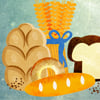Question:
Rabbi, I often see egg matzah for sale, and have been wondering whether we can serve it at the Seder instead of regular matzah. I have always found it so much tastier . . .
Answer:
The matzah used at the Seder must be made of only flour and water. This is because the Torah (Deuteronomy 16:3) refers to this matzah as lechem oni, which can be translated as “poor bread.” As you point out, matzah made with juice or eggs is much tastier, and is by definition “rich bread.” So egg matzah is out for fulfilling the mitzvah of eating matzah at the Seder.
But is it kosher for consumption during the rest of the holiday?
On Passover we are forbidden to eat chametz. Now, what constitutes chametz? A mixture of flour and water that has leavened, whether through the addition of yeast or the passage of time (18 minutes). However, flour mixed with other liquids, such as fruit juice, oil, wine or eggs, does not constitute chametz.
So far, it would seem that there would be no problem whatsoever with eating egg (or juice) matzah.
However, there is a caveat: If the flour was mixed with both water and any of those other liquids, it can become chametz. Not only that, it actually becomes chametz at a much faster pace than an ordinary flour and water. Because of this concern, it is forbidden to make matzah for Passover with a mixture of water and other liquids.
But how about matzah made of flour and a liquid—containing no water whatsoever?
Well, in light of the fact that matzah made with water and other liquids becomes chametz so quickly, Rabbi Moshe Isserles (16th century) notes the time-honored custom of Ashkenazic Jewry not to eat matzah that contains in its ingredients a liquid other than water, lest even a drop of water is mistakenly added to the dough. He adds, however, that an exception is made for the elderly or unwell, who are allowed to eat certified-kosher-for-Passover egg matzah.
Some Sephardic communities have also adopted this stringency, while others have not. So if you are Sephardic, please consult your rabbi to find out about your custom.
Wishing you a kosher and joyous Passover,
Rabbi Menachem Posner
P.S.: If you have some time, here is a wonderful class all about the spiritual difference between the “rich” and “poor” matzahs.








Join the Discussion